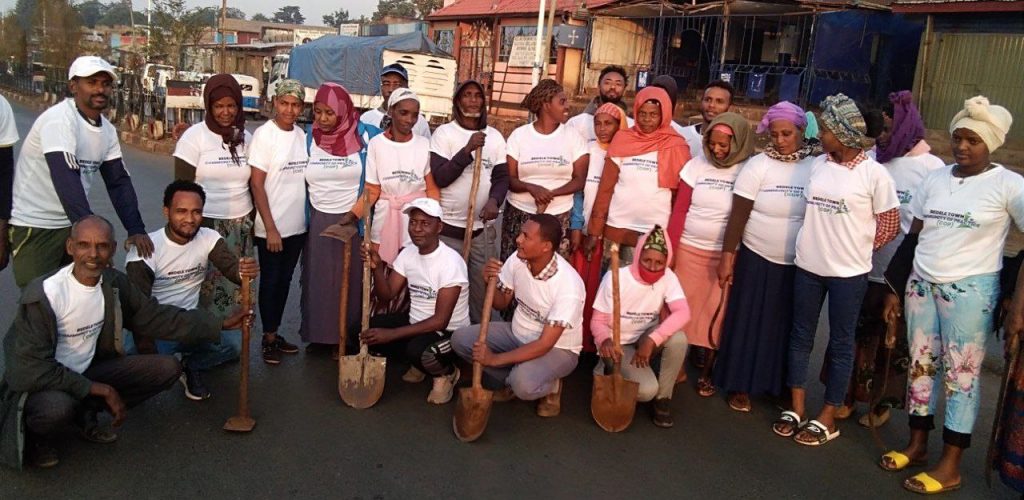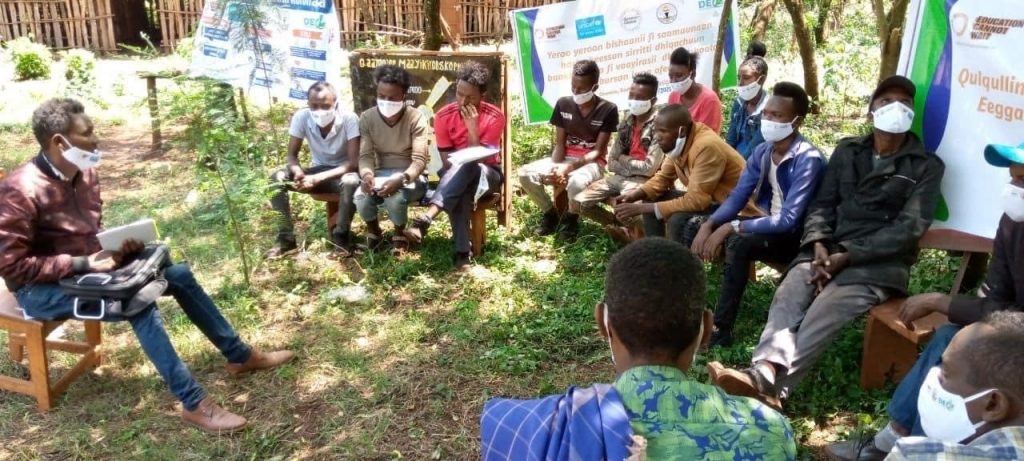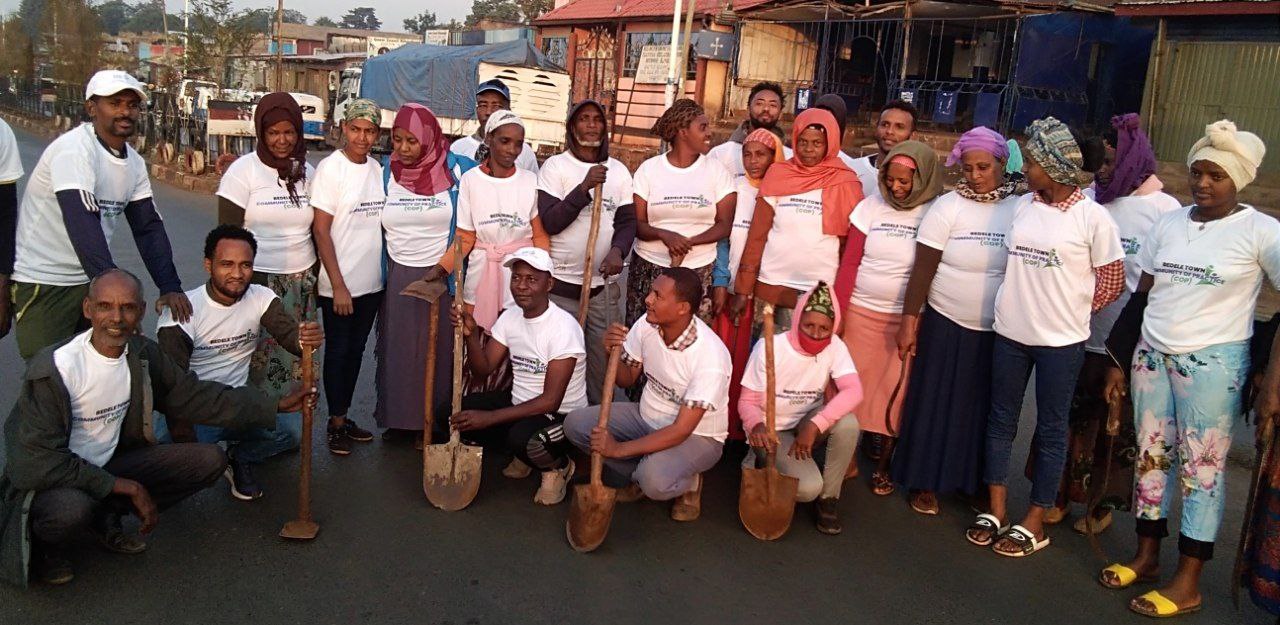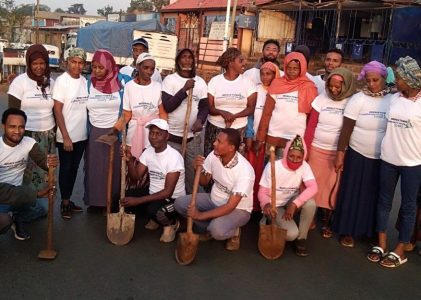
In 2018 when Prime Minister Abiy Ahmed came into power, there seemed to be renewed hope for the country when he set off a transitional period in Ethiopia, promising to reform the country’s authoritarian state, holding elections, and implementing some liberalization policies. His predecessor, Prime Minister Hailemariam Desalegn, had resigned in the face of mass protests. However, today Ethiopia remains beset by civil war and intercommunal violence, abuses by security forces and violations of due process are still common, and many restrictive laws remain in force. Since 2020, fighting between the Federal Government and the Tigray Defence Force has led to the displacement of 3.8 million people, another displacement of 420,887 IDPs due to drought (IOM April 2022), and credible allegations of atrocity crimes and violence have now spilled over into neighbouring regions. In these circumstances, it is small wonder that the Civicus Monitor has classed the state of civil society as repressed.
Against this backdrop, the Giving for Change programme is being implemented, using a new community philanthropy strategy to mobilize resources, to influence policymakers, and to amplify voices. And yet, advancing human rights issues is difficult, as many CSOs are fearful of being blacklisted by the government and labelled as a “pro rebel supporter”, and so hesitate to work on these issues, further limiting agency and collective voices for change.
What are the opportunities for change within this context and what does the future hold for the programme and Ethiopia? To learn how the work is shaping up, Ese Emerhi (Global Fund for Community Foundations) and Barry Knight (GFCF advisor) caught up with Daniel Asfaw, National Program Coordinator (Giving for Change Programme) with the Development Expertise Center, to learn more about their work in building community philanthropy through the Giving for Change programme.
This interview was conducted in June 2023.
The beginnings of the Giving for Change programme
Barry Knight (BK): How did this all start for you? What led you to do development work? And what was the environment like in Ethiopia at the start of the programme?
Daniel Asfaw (DF): This type of work has always been something I’ve been passionate about. However, before 2019 there weren’t many opportunities to engage in advocacy work due to the political environment in Ethiopia. The civic space under the previous administration was very restricted. Even though DEC had been involved in direct advocacy work with communities for some time now, it has not been easy. Around 2019, a lot of promises were being made by the new government of Prime Minister Ahmed. It was a period of transition and the civic space really benefited from this new positive mood at that time. The CSO Proclamation made by the new administration seemed to open up the civic space around areas of advocacy and human rights. This recognised that:
Civil society space provides the oxygen for citizens to participate and meaningfully hold their governments and the private sector to account – and ensure that decisions are made in the interest of the majority and not the few. Without it, citizens have limited space to dissent and challenge the elites.
Suddenly, the ground became fertile for the introduction of a programme like Giving for Change and DEC really took advantage of the promising environment in the country. However, things have taken a backward turn with the political environment, which has now become unpredictable. We need to be vigilant now more than ever with the growing repressive mood of the government.
How did I feel about the program? It was tricky at first. The objectives of the programme looked unrealistic, and I wondered: “how do we influence powerholders and other decision makers and bring communities together to amplify their voices? Everyone was suspicious of CSOs and the government?”
But the hook, the real entry point, was using community philanthropy to try to change mindsets. The Resource Mobilization Fund initiative motivated people and communities because, over time, they realized that they could influence decision-makers. It also helped us to expand our work, working with communities to identify the issues they want to work on and what their advocacy strategies might look like. They identify the problem, we help them craft a message and a plan around it, and then they mobilize funds to implement the project.
We have witnessed a shift in attitudes from some government entities; once they saw that our interest was only in building up capacities of communities and to create a more enabling environment [for development], they’ve been willing to work on changing some policy directives at the grassroots and national levels. The relationship with government entities is smoother now.
DEC has since expanded its influence from the community level to the national level. We have witnessed a shift in attitudes from some government entities; once they saw that our interest was only in building up capacities of communities and to create a more enabling environment [for development], they’ve been willing to work on changing some policy directives at the grassroots and national levels. The relationship with government entities is smoother now.
I’m a bit more confident about the work now. Not only are we building trust with communities, but as an organization, we are also building trust internally. Communities are starting to realize that they are responsible for their own development and can raise funds to solve their own challenges.
Ese Emerhi (EE): What difference has the Giving for Change programme made?
Daniel Asfaw (DF): It’s helped us have a smoother relationship with government entities and international donors in the country. We’ve been able to open more spaces through different national advocacy dialogues; interestingly, everyone shows up to the dialogues we organize.
For communities, it is now possible to re-imagine development. Using the Change the Game Academy model and trainings, we see that the different communities of practice and thematic working groups created are gaining trust with communities. It’s given communities and the different communities of practices the agency to push back on initiatives proposed by powerholders. For example, community members of Bedele Town had identified a small project to work on – building a community library. The mayor of that community, however, wanted them to build classrooms. From the advocacy and lobbying trainings we did with the community, they were able to push back effectively on the mayor’s demands and stick to their original idea of a community library using local resources.
Another example is work around human rights issue and abuse. In Batu, one of the Giving for Change implementation areas, there has been issues of environmental pollution and community health crisis due to the use of harmful chemicals to grow flowers by Dutch private sector flower farm companies. Rivers are polluted and higher numbers of cancer are reported. Using strategies and tactics from the rights-based trainings we offered, the community has raised awareness on environmental issues to advocate that foreign farm investors use less harmful chemicals in their production.
DEC has been involved in the push for localization of aid in the country for the past three years, and we use the opportunity of the annual “National CSO Week” to engage with international donors and government stakeholders. We’ve consistently organized the panel on localization of aid for the past three years — the National CSO Week is organized in a format of four concurrent panel sessions, and through our advocacy and influencing work with national stakeholders and INGOs, we have been able to show our impact and engagement with communities on the panel on localization of aid.
In terms of changing specific elements of the programme, it’s too early to say for now. There may be areas to focus more on or to do a little less of in the future, but those things have not been decided yet.
Working in conflict
Barry Knight (BK): Is the programme affected by the conflict currently going on, especially in the northern part of the country?
Daniel Asfaw (DF): The good thing is that the conflict is happening very far from the areas where we’re implementing the programme. However, due to restrictions on movements in some areas, checkpoints in others, it does affect us indirectly. The government requested support from companies and communities to aid them in the military’s fight against the rebels (food and clothing for soldiers, military supplies, etc.). The communities of practice initially resisted this call for support from the government because, to them the work of the CoPs were to advocate for a conflict-free country. And communities felt they were being asked for too much from all sides – the government for support for the military activities, and from the communities of practice for local development projects. The pressure has lessened somewhat now on these types of forced giving, and communities are able now to turn their limited resources to other local issues.
However, in the Oromia region of the country there is still some conflict going on. This does not give us a lot of confidence to really plan activities with some of our communities of practice. We’ve had to reschedule some of our activities, and the communities of practice have taken on the larger share of the work by working directly with the community there as they have gained the community’s trust. The communities of practice work in a neutral apolitical way, using technical working groups – a softer approach to working with decision makers – that has enabled some government agencies to get involved in their work.
Barry Knight (BK): What are the main challenges you feel you are facing with implementing this programme?
Daniel Asfaw (DF): Yes, of course there are challenges, but it all depends on the context and the districts where we work. Like I mentioned previously, there were limited opportunities to do national advocacy or human rights work because of the restrictive civic space with the last administration. Some CSOs still have some lingering trauma from past experiences doing this type of work; things like suspension of licenses or being thrown in jail. So, it’s been a lot of work to get communities and other CSOs to return to this type of advocacy work and for us to gain their trust.
When we talk about advocacy, it’s a two-way street. It requires robust advocacy but also a willingness from decision makers. Both sides need to be open and sit together to discuss opportunities and a way forward. In the beginning of our work with Giving for Change, many government agencies and representatives were reluctant to work with us or even to listen. We’ve had to find different ways to engage them, sometimes working with other partners who seem to have a better relationship with these power brokers.
It’s the same issue too working with communities. Communities are still stuck on the previous mindset where they think development is the responsibility of the government or CSOs. Slowly, with the results that we have been able to show, communities now see it’s possible to shift power and that they have the capacity to do development their way.
Ese Emerhi (EE): What could the programme and its partners do to help you overcome some of these challenges, or do you think the situation in Ethiopia is a unique one when it comes to advancing community philanthropy?
Daniel Asfaw (DF): The Giving for Change programme has really helped us to be more structured in our advocacy program. If we’re going to be doing work around #ShiftThePower or community philanthropy, it really needs to start first internally with the organization. Not only staff within the advocacy department, but staff across other units also needed to have their own understanding of these concepts and to build their confidence around it. The programme really helped us to have a more holistic approach and not to just see it as one project we must implement. By strengthening ourselves internally, we are able to build the capacity of others.
This programme has helped us attract other donors. We now have a new project called ‘CSF Plus’ that aspires to build the capacity of local civil society organizations for active participation on influencing public governance, funded by the EU. I think this new project would help us to expand our work to different areas in Ethiopia.

The future
Barry Knight (BK): What you’ve shared, Daniel, is really heartening. It’s a really good story of change! But now, how do you see the future going? What’s next for you? How do you see the remainder of the Giving for Change programme and what do you want to take forward?
Daniel Asfaw (DF): You know, whether we call it #ShiftThePower, localization, community philanthropy, all of it is still very much at a nascent stage here in Ethiopia because there are not a lot of examples of how to do development differently, and we don’t see others promoting it. We hope the communities of practice created can be able to sustain themselves beyond the programme. We can see how government representatives are responding well to the program. We try to encourage them to include elements of the Giving for Change programme – specially community philanthropy – into any new development initiatives they are planning when working with communities.
We must prepare ourselves to the changing political environment of the country. As I mentioned earlier, the environment now is unstable. And we don’t want to lose the momentum we have already built under this programme. And to keep these issues constantly at the forefront, we’ve now initiated a National Philanthropy Network in Ethiopia, bringing together other like-minded organizations and CSOs to advocate about the importance of community philanthropy, influencing the government in creating more of an enabling environment for philanthropy to thrive. We’ve started this journey with them.
And from our perspective, the future is promising!
Ese Emerhi (EE): Listening to you speak, Daniel, it’s clear to see the evolution of mindset change that has happened with you personally because of the work and also with DEC as an institution. Which is really what the core of the Giving for Change programme is all about, changing mindsets and behaviours and championing a different way of doing and making decisions. One thing I’m taking away from our conversation today is the importance of staying the long game and in being patient. That’s really what I’m getting from this. And… that it’s a lot of hard work!
A version of this article was also translated to French and Portuguese.

